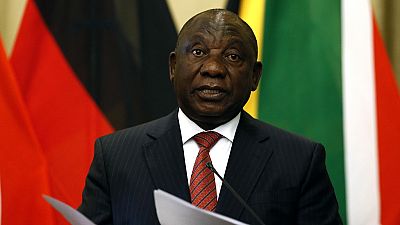Africa
South Africa’s president Cyril Ramaphosa, who took over as African Union chair on Sunday, has said Libya and South Sudan are the two conflicts he wants to focus on during his tenure.
‘‘There was an urgent need to deal with the action of countries outside our continent that are fighting proxy wars and fuelling ongoing conflicts on our continent,’‘ Ramaphosa said, reiterating the AU’s appeal for a greater role in solving conflicts on the continent.
The two-day summit ended in the early hours of Tuesday morning, with the traditional closing session and press conference cancelled. The decisions adopted were expected to be announced later Tuesday.
African solutions
The AU leadership has complained about being overlooked in Libya-related peacemaking efforts, which have been led primarily by the UN and heavily involved European nations.
As the 55-member group wrapped up a summit, Smail Chergui, the AU’s Peace and Security Council chief, offered assistance to revive Libya’s faltering peace process.
“It’s (the) UN itself which needs us now,” Chergui said. “It’s time to bring this situation to an end… the two organisations should work hand-in-hand for that goal,” he added.
The AU Commission (AUC) Chairperson Moussa Faki Mahamat emphasised the need for solidarity among African countries if the continent is to achieve its goals for peaceful and secure Africa, noting that “the deficit of solidarity is one of the big weaknesses of the system of resistance and Africa’s overall capacities for continental resilience.
The Libyan crisis
Libya has been torn by fighting between rival factions since a 2011 NATO-backed uprising killed dictator Moamer Kadhafi.
UN Secretary General Antonio Guterres on Saturday said he understood the AU’s “frustration” at having “been put aside” when it comes to Libya.
The North African state remains in chaos, mostly split between strongman Khalifa Haftar, who controls eastern Libya, and the UN-recognised government in Tripoli.
Talks between Libya’s warring factions ended on Saturday with no deal on a ceasefire. The UN has proposed a second round of negotiations for February 18.
Chergui said the AU could support peace if a cessation of hostilities agreement is finally signed, declaring the AU wanted to be part of an observer mission to ensure any deal is respected.
“This is an African problem, and we have a certain sense that maybe others do not have,” Chergui said.
Despite AU optimism, analysts are sceptical.
Observers pointed out that the AU will need to overcome financial constraints and internal divisions if it wants to achieve its goal of “Silencing the Guns” — the theme of summit talks.
“The AU bandwidth on Libya cannot in any way be compared to the UN’s involvement, just in simple terms of knowledge and presence on the ground,” said Claudia Gazzini, from the International Crisis Group think-tank.
Getting tough with South Sudan
Meanwhile, on South Sudan, leaders tried to bring longtime rivals together to reach a deal.
President Salva Kiir and rebel leader Riek Machar face a deadline of February 22 to form a unity government — a milestone that was delayed twice last year.
Ramaphosa met separately with Kiir and Machar on Saturday, and the rivals sat down in the same room Sunday alongside Ugandan President Yoweri Museveni and Sudanese Prime Minister Abdallah Hamdok.
Hamdok is the current chair of the eight-member East African bloc IGAD, which has taken the lead in South Sudan peace negotiations.
But the flurry of activity on the sidelines of the AU summit did not result in a breakthrough in the dispute over the number of regional states in South Sudan — a contentious issue as the borders will set out divisions of power and control in the young country.
IGAD said that despite the lack of progress to date there could be no more delays in forming a power-sharing government.














Go to video
Semenya ruling shakes foundations of gender rules in sport
01:53
SMES under pressure as business confidence hits four-year low in South Africa
Go to video
South Sudan's president Salva Kiir dismisses army chief Paul Nang Majok
01:24
South Sudan: World Food Programme airdrops food, warns of famine
Go to video
Former South African deputy president David Mabuza dies at 64
01:05
South Africa: year of power marred by new scandal in coalition government